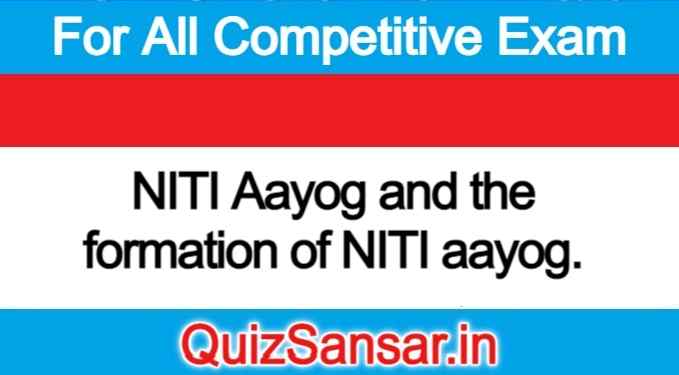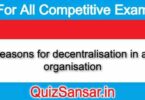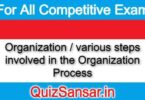
NITI Aayog and the formation of NITI aayog.
NITI Aayog or National Institution for Transforming India Aayog is basically a policy think tank of Government of India and State Governments that replaces 65-year old Planning Commission. Union Government of India had announced formation of NITI Aayog on 1st January, 2015. The NITI Aayog will have a governing council comprising all State Chief Ministers and Lt. Governors of Union Territories and will work towards fostering a ‘Co-operative federalism‘ for providing a “national agenda” to the Centre and States.
The body is comprised of a CEO and a Vice Chairperson, to be appointed by the Prime Minister, in addition to some full-time members and two part-time members, while four Union Ministers would serve as ex-officio members. Besides, there would be specific regional councils, while experts and specialists from various fields would be called as special invitees nominated by the Prime Ministers.
NITI Aayog will serve as a “think tank” of the government as a “directional and policy dynamo” and would provide both to the governments at the centre and in the states with strategic and technical advice on key policy matters including economic issues of national and international importance.
Thus NITI Aayog will never plan, rather it will formulate policy. By following these policies, various Ministries of the Central Government will prepare developmental projects considering the need of long term development. NITI is in favour of cooperative federal structure where both the Centre and States jointly prepare developmental policies.
But NITI, at the same time, wants to promote healthy competition among the developing states.
Thus, the propulsive concept behind the new body would be “co operative federalism” entailing that the states to have their say in framing plans and policies for development. The NITI Aayog has been envisaged as a kind of inclusive think-tank embracing the Centre and States to give strategic and technical advice on economic matters of national and global importance.
NITI Aayog will have regional councils to focus on developmental activities on specific areas and is patterned on the National Reforms Development Commission of China.
While the Planning Commission had the power to allocate funds to states for attaining regional development, the NITI Aayog will not have such powers. Rather, the task of allocating funds to states now being vested with the Finance Ministry’s Department of Expenditure.
Its primary job would be to undertake long term policy and design frameworks and take necessary initiatives for attaining faster development and finally to monitor these activities sincerely.
Thus, NITI Aayog will actively monitor and evaluate implementation of the Government programmes and initiatives. The Planning Ministry of present NDA Government is of the view that “with central plan expenditure of the order of Rs 5.75 lakh crore was being channelized per year for development, it was absolutely necessary that there is concurrent, comprehensive, credible and reliable evaluation”.
This step mainly focuses on strategies to spread awareness about and use of evaluation as a tool for enhancing result from policies and
programmes of good governance. So it was time to consider developing a National Evaluation Policy that would provide direction to Monitoring and Evaluation (M&E) activities in the country, laying stress upon quality standards and sound ethical procedures and provide for appropriate institutional mechanisms.
NITI Aayog would therefore mean:
(a) A group of people with authority entrusted by the government
to formulate/regulate policies concerning transforming India. (b) It is a commission to assist government in both social and economic issues.
(c) It is an institute of think tank with experts in it.
(d) It is an body to actively monitor and evaluate implementation of government programmes and initiatives.
Formation of NITI Aayog:
The NITI Aayog comprises the following members and bodies: 1. Prime Minister of India as the chairperson.
2. Governing Council comprising the Chief Ministers of all States and Union Territories with legislatures and Lieutenant Governors of other Union Territories.
3. Regional Councils will be formed to address specific issues and contingencies impacting more than one state or a region. The aim of the Regional Councils is to amicably settle disputes between two or more states facing a common set of problems that usually delay the progress of developmental projects.
These councils will be formed for a specified tenure. The Regional Councils will be convened by the Prime Minister and will comprise of the Chief Ministers of States and Lt. Governors of Union Territories in the region for addressing specific issues. These Regional Councils will be chaired by the chairperson of the NITI Aayog or his nominee.
4. Experts, specialists and practitioners with relevant domain knowledge will be called as special invitees, to be nominated by the Prime Minister.
5. Full-time organizational framework (in addition to Prime Minister as the Chairperson) includes the following positions:
(i) Vice-Chairperson.
(ii) Members: Two (2) Full-time.
(iii) Part-time Members: Maximum of two from leading universities, research organizations and other relevant institutions in an ex-officio capacity. Part-time members will be on a rotational basis.
(iv) Ex-officio Members: Maximum of four members of the Union Council of Ministers to be nominated by the Prime Minister.
(v) Chief Executive Officer (CEO). To be appointed by the Prime Minister for a fixed tenure, in the rank of Secretary to the Government of India.
(vi) Special Invitees.
(vii) Secretariat as deemed necessary for its functioning.
Present Members of NITI Aayog:
Presently, following members are included in the NITI Aayog in different capacities:
1. Chairperson: Prime Minister Narendra Modi.
2. CEO: Sindhushree Khullar.
3. Vice Chairperson: Arvind Panagariya (Well known India born er.onomist and Columbia University Professor)
4. Ex-officio Members: Rajnath Singh, Arun Jaitley, Suresh Prabhu and Radha Mohan Singh.
5. Special Invitees: Nitin Gadkari, Smriti Zubin Irani and Thawar Chand Gehlot. Line moet
6. Full-time Members: Bibek Debroy and V.K. Saraswat.
7. Governing Council: All Chief Ministers and Lieutenant Governor of Union Territories.






